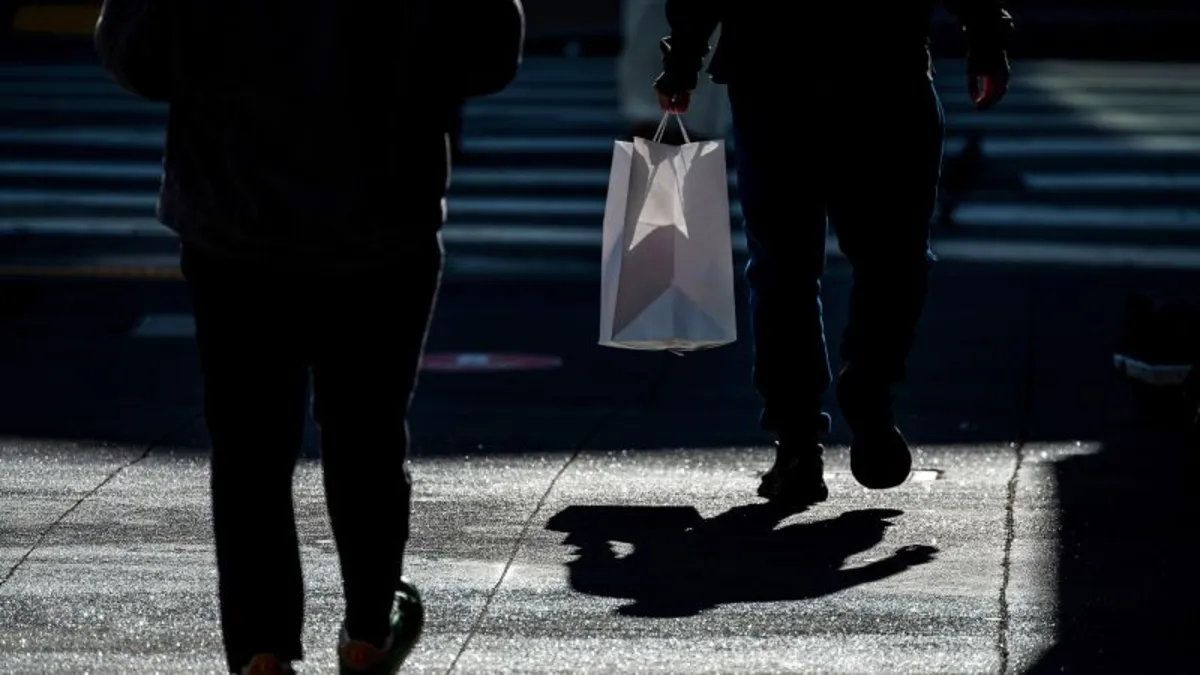
In early February, John Schwarz, a self-proclaimed mindfulness and meditation facilitator, ignited a movement with his proposal for a 24-hour nationwide economic blackout on February 28. Schwarz urged consumers to refrain from spending at major retailers like Amazon and Walmart for an entire day, advocating instead for purchases at small businesses and essential needs. “The system has been designed to exploit us,” he stated in a video aimed at his 250,000 followers on social media platforms like Instagram and TikTok. “On February 28, we are going to remind them who really holds the power. For one day, we turn it off.”
At 57 years old, Schwarz has no formal background in social or political organizing. Prior to this movement, his social media presence primarily consisted of inspirational messages and motivational tips filmed in various casual settings, such as his home and shopping mall parking lots. Initially, he anticipated that his boycott message would attract only a small number of supporters. “I thought maybe a handful of my followers would do it,” he recounted in a recent interview with CNN. However, his message quickly went viral, accumulating over 700,000 shares on Instagram and reaching 8.5 million views. Prominent figures, including Stephen King, Bette Midler, and Mark Ruffalo, have also shown their support, further amplifying the boycott.
The economic blackout has emerged as a loosely organized effort, yet it resonates with widespread dissatisfaction towards the American economy and corporate practices. Experts in consumer boycotts are skeptical of its potential impact on the financial health of major corporations. Effective boycotts are typically well-structured, with clear objectives focused on specific companies or issues. Despite this, the grassroots nature of the blackout has tapped into a deep-seated public frustration. As noted by Lawrence Glickman, a historian and author, “There’s the sense that a lot of people want to do something. Doing something in the American context has often meant using pocketbook politics.”
The motivations for joining the boycott vary widely among individuals. Some participants express concerns over rising prices and the overall cost of living, while others are frustrated by the concentration of power among large corporations and billionaires like Elon Musk. Furthermore, many are reacting against the Trump administration’s perceived attempts to undermine federal programs and fear a potential shift towards autocracy in America. Others are particularly focused on companies that have scaled back their Diversity, Equity, and Inclusion (DEI) initiatives.
In response to the overwhelming support, Schwarz established a group called The People’s Union, describing it as a movement created “by the people, for the people” to combat corporate control, political corruption, and economic injustice. He has launched a GoFundMe campaign that has raised approximately $70,000 for social campaigns and legal advocacy. Additionally, Schwarz has hinted at future, more targeted boycotts against companies like Amazon and Walmart. While Walmart has opted not to comment, Amazon has not responded to inquiries.
Interestingly, although the response to the boycott appears to be strongest among left-leaning individuals, Schwarz himself does not align strictly with either political party. While he supports Bernie Sanders, his views are varied, advocating for policies like the abolition of federal income tax, term limits in Congress, universal healthcare, and price caps. “The boycott has spread so well because people have just had enough and they’re fed up and they’re tired,” Schwarz remarked.
The timing of Schwarz’s boycott coincides with intensified scrutiny of retailers, particularly Target, for their retreat from DEI initiatives. Following pressure from activists and right-wing legal groups, many Fortune 500 companies, including Target, have rolled back their diversity programs. Target’s decision to eliminate hiring goals for minority employees and other changes to its initiatives have sparked significant backlash, particularly among Black consumers. Rev. Jamal Bryant has called for a 40-day boycott of Target starting March 5, coinciding with Lent, urging participants to support Black-owned businesses during this period.
Recent data indicates that consumer traffic to major retailers has slowed, with Target experiencing the most significant decline. According to Placer.ai, customer visits to Target dropped by 7.9% in the week of February 10, compared to a 4.8% decrease at Walmart. Interestingly, traffic to Costco, which has maintained its DEI policies, saw a 4.8% increase. This data suggests a potential correlation between Target’s retreat from DEI efforts and a decrease in customer visits, although external factors such as weather and economic conditions may also play a role.
Despite the momentum surrounding the blackout and the backlash against Target, sustaining a boycott over an extended period is notoriously difficult. Experts suggest that consumer habits are fickle, and it can be challenging to maintain momentum beyond a few weeks. Additionally, boycotts often provoke counter-reactions, with supporters mobilizing to increase their spending at targeted companies, thereby undermining the boycott’s impact. Successful recent boycotts, such as the backlash against Bud Light due to its partnership with a transgender influencer, demonstrate that consumer boycotts can raise awareness and pressure companies to change, but they rarely deliver crippling financial blows.
While boycotts may not always achieve their intended financial impact, they can serve as powerful tools for raising public awareness and pressuring companies to reconsider their practices. Historical examples demonstrate that sustained public pressure can lead to significant changes in corporate behavior. As the economic blackout approaches, it remains to be seen how effective this movement will be in shaping consumer attitudes and corporate policies in the long run.